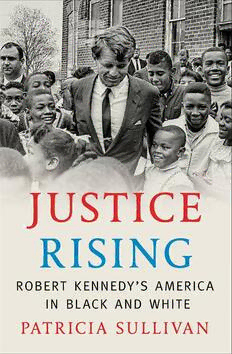
Justice Rising: Robert Kennedy’s America in Black and White PDF
Preview Justice Rising: Robert Kennedy’s America in Black and White
JUSTICE RISING J U S T I C E R I S I N G ROBERT KENNEDY’S AMER I CA IN BLACK AND WHITE Pat ric ia Su l l i va n THE BELKNAP PRESS of HARVARD UNIVERSITY PRESS Cambridge, Mas sa chu setts & London, England 2021 Copyright © 2021 by Patricia Sullivan All rights reserved Printed in the United States of Amer i ca First printing Cover design: Jaya Miceli Cover photograph: Jim Lucas, © James Lucas Estate 9780674259768 (EPUB) 9780674259782 (PDF) The Library of Congress has cataloged the printed edition as follows: Names: S ullivan, Patricia, 1950– author. Title: Justice rising : Robert Kennedy’s Amer i ca in black and white / Patricia Sullivan. Description: Cambridge, Mas sa chu setts : The Belknap Press of Harvard University Press, 2021. | Includes index. Identifiers: LCCN 2020050236 | ISBN 9780674737457 (cloth) Subjects: LCSH: Kennedy, Robert F., 1925–1968. | Civil rights movements— United States— History—20th century. | Racial justice— United States— History—20th century. | Blacks— Civil rights— United States— History—20th century. | United States— Race relations— History—20th c entury. Classification: LCC E185.61 .S934 2021 | DDC 323.1196/0730904— dc23 LC rec ord available at https:// lccn . loc . gov / 2020050236 For my mother, Doris M. Sullivan, and in memory of my father, Thomas J. Sullivan CONTENTS Preface: “The Best a White Amer i ca Has to Offer” ix · 1 M isfit 1 · 2 Along the Color Line: The 1950s 16 · 3 F Aith, Hope, And Politics 44 · 4 B lAck Votes 63 · 5 S imple Justice 82 · 6 T he ChAllenge of A De cAde 114 · 7 F reedom Now 148 · 8 “ A G reAt ChAnge Is At HAnd” 179 · 9 O n His Own 214 · 10 T rAnsitions 236 · 11 B eyond Civil Rights 255 · 12 S uppose God Is BlAck 292 · 13 R eckoning 324 · 14 T he GrAvest Crisis since the Civil WAr 346 · 15 O ur Country’s F uture 364 · 16 A Time of DAnger And Questioning 391 · 17 T he LAst of the GreAt BelievAbles 420 Epilogue 443 Notes 451 Acknowledgments 493 Index 497 PREFACE “The Best a White Amer i ca Has to Offer” in mAy 1963, Birmingham, Alabama, was edging toward a race war. Im- ages of the city’s police using dogs and high- pressure fire hoses to assault hundreds of protesting Black youth were televised across the country, thrusting Amer i ca’s racial crisis to the forefront of public awareness. Near midnight on Saturday, May 11, a series of bombs exploded at the hotel where Martin Luther King Jr. had been staying. The bombings brought thousands into the streets, where they battled police into the early hours of the morning. The vio lence in Birmingham set off a wave of demonstrations in cities across the country. James Baldwin’s prophetic warning in The Fire Next Time, pub- lished just a few months e arlier, seemed on the verge of being realized. After two years of equivocating on the prob lem of race, President John F. Kennedy faced the enormity of the nation’s racial crisis. History, law, custom, and politics had buttressed a repressive society that now appeared to be bursting at the seams. By spring 1963, the volume and the demands of Black protest could no longer be ignored. Malcolm X observed that it was the specter of Black people demonstrating “their ability to defend themselves” that fi nally stirred the Kennedy administration to action. But the president was reacting in at least equal mea sure to states and localities using their power to enforce segregation at all costs.1 Robert F. Kennedy, the thirty- seven- year- old US attorney general, was the administration’s chief official in the area of civil rights. Since he took office in January 1961, escalating protests and defiance of court orders in the South had tested the reach of federal power. The early efforts of the attorney gen- eral and his staff to enforce school desegregation and prosecute officials who refused to register Black voters had far surpassed the rec ord of previous ad- ministrations, but Kennedy’s actions seemed overly cautious and po liti cally calculated to those facing the brunt of southern lawlessness and vio lence. On May 17, Bobby Kennedy and a team of Justice Department lawyers began the intensive work of drafting legislation that would outlaw the
